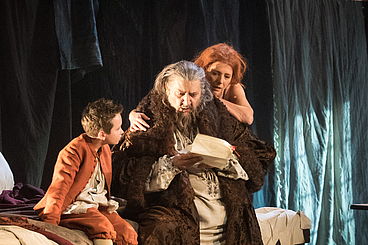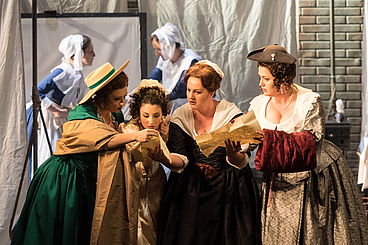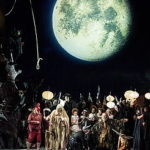 For Vienna State Opera’s new (2016) production of Verdi’s Falstaff, David McVicar has recreated an Elizabethan tavern for the Garter Inn where Sir John Falstaff lives. Falstaff (Ambrogio Maestri) sits surrounded by the innkeeper’s family, the bustle of children playing, his ‘retinue’ Bardolfo (Herwig Pecora), Pistola (Ryan Speedo Green), and the odd prostitute flitting through. It’s recreating the energy and rude excitement of the time, as did Shakespeare in Love. Charles Wood’s handsome oak-effect stage construction, with its overhead gallery, serves Verdi’s and librettist Boito’s opera, within the complex plotting the men listening in on their female counterparts intriguing on the lower stage. And with Verdi’s famous ensembles perfected, different voices on different levels sing from different sheets. The costumes are stunning in their detail, sumptuous, richly colourful, the historical authenticity exemplified by a portrait of Elizabeth 1 (as if, they were mass-produced!), and a suspended galleon.
For Vienna State Opera’s new (2016) production of Verdi’s Falstaff, David McVicar has recreated an Elizabethan tavern for the Garter Inn where Sir John Falstaff lives. Falstaff (Ambrogio Maestri) sits surrounded by the innkeeper’s family, the bustle of children playing, his ‘retinue’ Bardolfo (Herwig Pecora), Pistola (Ryan Speedo Green), and the odd prostitute flitting through. It’s recreating the energy and rude excitement of the time, as did Shakespeare in Love. Charles Wood’s handsome oak-effect stage construction, with its overhead gallery, serves Verdi’s and librettist Boito’s opera, within the complex plotting the men listening in on their female counterparts intriguing on the lower stage. And with Verdi’s famous ensembles perfected, different voices on different levels sing from different sheets. The costumes are stunning in their detail, sumptuous, richly colourful, the historical authenticity exemplified by a portrait of Elizabeth 1 (as if, they were mass-produced!), and a suspended galleon.
Ambrogio Maestri’s Falstaff, unruly grey hair and goatee beard, holds court, wearing a jacquard-patterned house coat over a white smock: dissolute, he could be a Fagin in a den of thieves. Steal with style and at the right time, he sings.’Not a penny left’, so his dossers will have to go.
Maestri, his glorious baritone even more complexly characterised has, as it were, grown into the role since I last saw him in Marelli’s (2011) production. Maestri’s Falstaff is a world-renowned phenomenon. Expansive like an oriental potentate, he points to his stomach, and sings, This is my Kingdom, I plan to expand it. “Mighty Falstaff”, his sycophants reply. Yet convinced he’s God’s gift to women, he writes love letters to the wealthy wives of Windsor, Anne Ford and Meg Page. Imagining their assent, “I am yours”, Sir John Falstaff- Maestri’s voice breaks into a falsetto. In the burlesque, the trio of them shall be his ‘Gold Coast’. After all, he is still in his Indian summer.
Earlier Dr. Caius (Benedikt Kobel) complained of being robbed by Bardolpho and Pistola. In Falstaff’s great aria Honore, he first castigates these low-life poltroons. Honour, a fine word: but impractical. Can a dead man feel honour? Nothing but an empty word. This is the once-honourable knight- the cowardly cheat – exposed in Shakespeare’s Henry IV), and exiled by the new King. But Shakespeare’s Merry Wives of Windsor is comedy, rather than tragedy, and in librettist Boito’s reworking, Verdi’s only comic opera.
The stage curtain raised between the scenes shows an elaborate genealogy of the Falstaff family – like a blown-up Elizabethan manuscript- literally a family tree. It looks authentic, but it’s meant to mock Falstaff’s inflated self-importance, and his fall from grace.
Scene 2, outside Ford’s house. There’s washing on the line. The Ladies of Windsor meet to exchange gossip. Alice Ford (Olga Beszmertna), in emerald-green silk, announces she’s soon to be a noblewoman.  She’s received a letter from a Knight – but so has Meg (Margaret Plummer) – the wording identical. Radiant Alice. Radiant Meg. Just tell me I love you! A pair in love: a beautiful lady with a man of substance, Beszmertna’s Alice ravishingly sung. ( A maid staggers overhead carrying bed linen.) So the women resolve to make a fool of Falstaff, “that whale, that king of bellies, wine vat, monster and scoundrel.” It smacks rather of #MeToo revenge, (hundreds of) years before a Studio Mogul’s serial abuse.
She’s received a letter from a Knight – but so has Meg (Margaret Plummer) – the wording identical. Radiant Alice. Radiant Meg. Just tell me I love you! A pair in love: a beautiful lady with a man of substance, Beszmertna’s Alice ravishingly sung. ( A maid staggers overhead carrying bed linen.) So the women resolve to make a fool of Falstaff, “that whale, that king of bellies, wine vat, monster and scoundrel.” It smacks rather of #MeToo revenge, (hundreds of) years before a Studio Mogul’s serial abuse.
Overlooking the Wives of Windsor, ‘Four people are talking at once’. Bardolfo and Pistola- dismissed by Falstaff – warn Ford, the monster Falstaff plans to enter your house; written a note to Alice Ford. (Falstaff is ‘always making eyes at the gods’). Ford (star English baritone Christopher Maltman), sings, he’ll protect ‘what’s his from the eyes of others,’ (Women and wives seen as property, not just in these Shakespearean times.)
Enter Nannetta, his daughter( Hila Fahima) and her suitor Fenton, (Jinxu Xiahou), who’s being blanked by Ford. Ford will have his daughter married to his crony, the miserable Dr.Caius (Benedikt Kobel): a brokered marriage of financial and social advantage.
Fenton’s aria (Xiahou’s fabulous tenor) is lyrically sung, a non-European underlining his outsider status; but love will prevail over patriarchal interests. Fenton closes up to Nannetta. Kissed lips do not lose their sheen, Fahima quite enchanting as Nannetta; Xiahou’s Fenton, sings, in his heart there’s only room for love, their innocence contrasts with their elders’ intriguing.
The women determined on vengeance, Alice orders Mrs. Quickly to invite Falstaff to visit her at home. “Man returns to his vices like a cat to his cream”, sings Falstaff, (opening Act 2). But Mrs. Quickly has the better of him. Monica Bohinec’s is shrewdly characterised, her supple mezzo capable of a deep lower range (as she ventriloquizes her master’s voice.) She flatters him with the message Alice is madly in love with him: Poor soul, you are a great seducer! Quickly’s deference is a little exaggerated, but Falstaff is taken in. Yet Verdi’s tender orchestration builds this into a romantic scene, hinting at perhaps a longtime affair. He almost caresses her as she leaves.
Falstaff, congratulates himself on his still potent attractions, and declares, woman are cunning by nature. Maestri, swaggers lewdly, Good old John, suddenly your body helps you to pleasure.
 But Ford has set a trap for Falstaff. ‘Senor Fontana’ (Maltman) in a red scarlet coat and breeches- one who spends money as it pleases him- come to ask Falstaff’s help wooing a lady in Windsor, an Alice Ford. Falstaff boasts he’s meeting her between 2 and 3, when ‘the fool who is her husband is always out.’ Maestri preens himself, while Ford’s jealously worried. Maltman, always impressive, agonises in Ford’s aria, am I dreaming, is it true? Mr Ford, wake up! They say you cannot take a jealous husband seriously. Marriage is a hell. Woman, a demon! (More misogyny.)
But Ford has set a trap for Falstaff. ‘Senor Fontana’ (Maltman) in a red scarlet coat and breeches- one who spends money as it pleases him- come to ask Falstaff’s help wooing a lady in Windsor, an Alice Ford. Falstaff boasts he’s meeting her between 2 and 3, when ‘the fool who is her husband is always out.’ Maestri preens himself, while Ford’s jealously worried. Maltman, always impressive, agonises in Ford’s aria, am I dreaming, is it true? Mr Ford, wake up! They say you cannot take a jealous husband seriously. Marriage is a hell. Woman, a demon! (More misogyny.)
Now Falstaff, Maestri in a splendid gold satin outfit, prepares for his date with Alice. Quickly’s account of how she duped Falstaff, sung by Bohinec with awesome low notes, parodying his voice, accented by piquant flute playing. The Merry Wives vow, We’ll show him! It depends on us! As if these women would be taken in by his ploys. So Alice plays him along. Maestri sings,oh, radiant flower, I am here to pluck you! She remonstrates, a poor lady, knows nothing of flattering ways. She pushes away the chair that separates them, retreating to the back of the room. He uses force. Suddenly he has her over the table. Saved in time by the arrival of the Ladies. Warning Falstaff to escape in haste: of Ford, in a blind fury, raging like a tempest.
The famous laundry basket scene is a masterpiece in comic timing. Guards in black, perhaps from the Tower of London, fearsomely armed, block the way out. Maestri is pushed into the king-size laundry basket. Ford gleefully points his sword. Danger adds spice to the game, sings Alice. Maestri held down in that basket, comes up for air looking desperate. They keep adding more dirty Laundry. Somehow they move the laundry basket – a giant hamper containing Maestri – off stage. Plump! into the Thames.
Maestri triumphs in Falstaff’s aria, singing of a bad, pitiful world of trickery. ‘All gone to the dogs.’ I’m getting too fat, he admits, going grey. Heaven help me! But, defiantly, he’ll ‘add some more wine to Thames water.’ He emerges from a tub, swathed in white linen sheets.
The ‘Chimes of Midnight’ scene is such spectacle, an event in itself, almost detracting from the darker purpose: the abjection of Falstaff, his humiliation his penitence, even. Silver moon, an oak tree, a clock set at midnight. Xiahou’s Fenton sings exquisitely of true love, first love, and how love sours with physical decay.
Maestri, in a fur coat, antlers protruding from his head, sings even Jove had to change into a bull to seduce Europa. Now magical child dancers – Vienna Ballet Academy, the fairies in a supernatural pageant; a Fairie Queen; black, masked phantoms. Poor Falstaff, pinched by devils, poked by fairies. ‘Gnats and mosquitoes bite him till he burst.’ Revenge! Liar, Parasite, Fatso. Say you are sorry! Make him virtuous. -But spare my belly, protests Maestri’s Falstaff. (Then he recognises Pistola.)
Did he believe two women could be so simple, they sing. Yet Falstaff accepts the situation gracefully, and somehow turns it around. (Ford taunts him, who looks the fool now. But, in the reconciliation, Ford has to give Nannetta and Fenton his blessing.)
I am both witty myself and inspire wit in others, Falstaff boasts. And center-stage, Maestri holds court, leading the cast into a fugue. Everything in the world is a jest. Tutto del mondo è buria. But he who laughs last, laughs loudest.
Verdi’s last opera, his apotheosis, is to be relished. McVicar’s production is a joy, the opera performed as if in a Shakespearean theatre, which Verdi and Boito would have admired. Vienna State Opera Orchestra and Chorus were conducted with brio by James Conlon. © P.R. 30.06.2018
Photos: Ambrogio Maestri (Falstaff); Olga Bezsmertna (Alice Ford), Monika Bohinec (Mrs.Quickly), Margaret Plummer (Meg Page); Christopher Maltman (Ford)
© Wiener Staatsoper/ Ashley Taylor; Featured image: Ambrogio Maestri and Carmen Giannattasio © Wiener Staatsoper/ Michael Pöhn
